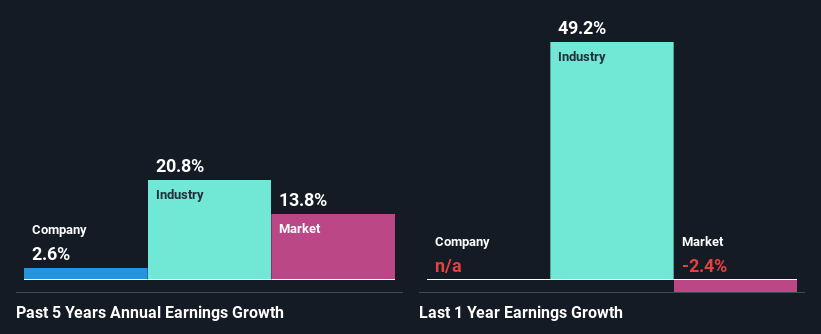Has Sea Limited's (NYSE:SE) Impressive Stock Performance Got Anything to Do With Its Fundamentals?
Sea (NYSE:SE) has had a great run on the share market with its stock up by a significant 34% over the last three months. As most would know, fundamentals are what usually guide market price movements over the long-term, so we decided to look at the company's key financial indicators today to determine if they have any role to play in the recent price movement. Specifically, we decided to study Sea's ROE in this article.
Return on Equity or ROE is a test of how effectively a company is growing its value and managing investors’ money. In other words, it is a profitability ratio which measures the rate of return on the capital provided by the company's shareholders.
View our latest analysis for Sea
How To Calculate Return On Equity?
Return on equity can be calculated by using the formula:
Return on Equity = Net Profit (from continuing operations) ÷ Shareholders' Equity
So, based on the above formula, the ROE for Sea is:
11% = US$697m ÷ US$6.6b (Based on the trailing twelve months to September 2023).
The 'return' is the income the business earned over the last year. One way to conceptualize this is that for each $1 of shareholders' capital it has, the company made $0.11 in profit.
What Is The Relationship Between ROE And Earnings Growth?
So far, we've learned that ROE is a measure of a company's profitability. Depending on how much of these profits the company reinvests or "retains", and how effectively it does so, we are then able to assess a company’s earnings growth potential. Assuming all else is equal, companies that have both a higher return on equity and higher profit retention are usually the ones that have a higher growth rate when compared to companies that don't have the same features.
Sea's Earnings Growth And 11% ROE
At first glance, Sea seems to have a decent ROE. Be that as it may, the company's ROE is still quite lower than the industry average of 14%. On further research, we found that Sea's net income growth of 2.6% over the past five years is quite low. Not to forget, the company does have a decent ROE to begin with, just that it is lower than the industry average. So there might be other reasons for the earnings growth to be low. Such as, the company pays out a huge portion of its earnings as dividends, or is facing competitive pressures.
Next, on comparing with the industry net income growth, we found that Sea's reported growth was lower than the industry growth of 21% over the last few years, which is not something we like to see.
The basis for attaching value to a company is, to a great extent, tied to its earnings growth. It’s important for an investor to know whether the market has priced in the company's expected earnings growth (or decline). Doing so will help them establish if the stock's future looks promising or ominous. Is SE fairly valued? This infographic on the company's intrinsic value has everything you need to know.
Is Sea Using Its Retained Earnings Effectively?
Sea doesn't pay any dividend currently which essentially means that it has been reinvesting all of its profits into the business. This doesn't explain the low earnings growth number that we discussed above. So there could be some other explanation in that regard. For instance, the company's business may be deteriorating.
Conclusion
On the whole, we do feel that Sea has some positive attributes. However, while the company does have a decent ROE and a high profit retention, its earnings growth number is quite disappointing. This suggests that there might be some external threat to the business, that's hampering growth. With that said, the latest industry analyst forecasts reveal that the company's earnings are expected to accelerate. To know more about the latest analysts predictions for the company, check out this visualization of analyst forecasts for the company.
Have feedback on this article? Concerned about the content? Get in touch with us directly. Alternatively, email editorial-team (at) simplywallst.com.
This article by Simply Wall St is general in nature. We provide commentary based on historical data and analyst forecasts only using an unbiased methodology and our articles are not intended to be financial advice. It does not constitute a recommendation to buy or sell any stock, and does not take account of your objectives, or your financial situation. We aim to bring you long-term focused analysis driven by fundamental data. Note that our analysis may not factor in the latest price-sensitive company announcements or qualitative material. Simply Wall St has no position in any stocks mentioned.

